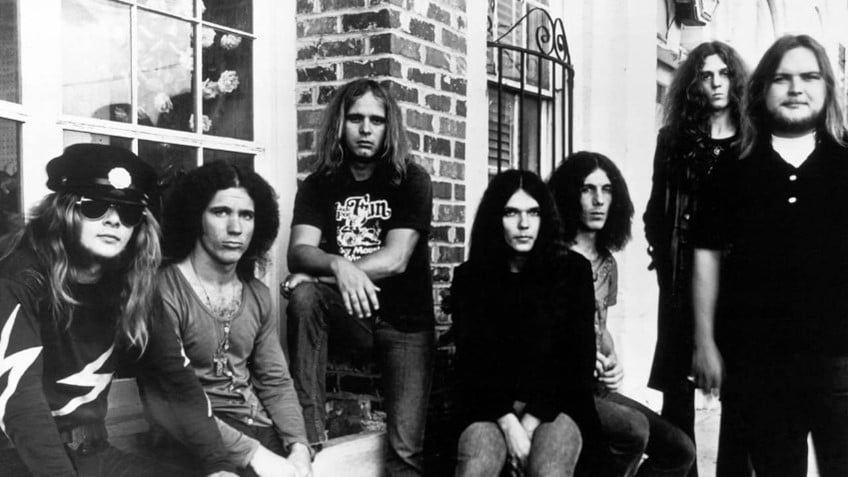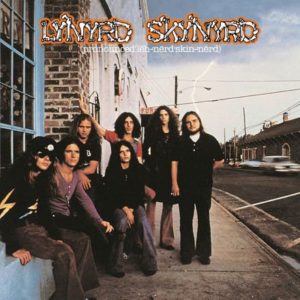February 11, 2022 —– Chart #130
Hello Music Friends,
Welcome to Friday and another winter weekend. Occasionally I get requests from the audience and sometimes the requests are good ones (uh, sometimes not so much!). Today I am honoring a request from an old friend, partly because he is an old friend and partly because the suggestion is a great song and a great band from my high school days. The band is Lynyrd Skynyrd and the song is . . . no, not Freebird . . . . . no, not Sweet Home Alabama . . . . a simple and memorable tune from their first album, Simple Man.
“Simple Man” is the last track on side one of Lynyrd Skynyrd’s debut album, released in 1973. The song is one of Lynyrd Skynyrd’s most popular songs. Since the song became available for digital download, it has become Lynyrd Skynyrd’s third best-selling digital song after “Sweet Home Alabama” and “Free Bird.” It has sold 1,333,000 copies in the U.S. as of November 2013. “Simple Man” is written in the key of A minor/C major, though all guitars were tuned down a half step, effectively making it G# minor/B. The song begins with an acoustic arpeggiated chord sequence made up of the chords C major, G major and A minor (though with the tuned-down guitars, effective progression of B major, F# major and G# minor). This intro is accompanied by a bass line and cymbals before the drums and vocals come in for the verse. Lyrically the song is about a mother talking to her child about life, inspired by the passing of Ronnie Van Zant’s grandmother. The chorus of the song includes electric guitars imitating sections of the arpeggiated intro progression. The guitar solo is performed by Gary Rossington.
Lynyrd Skynyrd is an American rock band formed in Jacksonville, Florida. The group originally formed as My Backyard in 1964 and comprised Ronnie Van Zant (lead vocalist), Gary Rossington (guitar), Allen Collins (guitar), Larry Junstrom (bass guitar) and Bob Burns (drums). The band spent five years touring small venues under various names and with several lineup changes before deciding on “Lynyrd Skynyrd” in 1969. The band released its first album in 1973, having settled on a lineup that included bassist Leon Wilkeson, keyboardist Billy Powell and guitarist Ed King. Burns left and was replaced by Artimus Pyle in 1974. King left in 1975 and was replaced by Steve Gaines in 1976. At the height of their fame in the 1970s, the band popularized the Southern rock genre with songs such as “Sweet Home Alabama” and “Free Bird”. After releasing five studio albums and one live album, the band’s career was abruptly halted on October 20, 1977, when their chartered airplane crashed, killing Van Zant, Steve Gaines, and backup singer Cassie Gaines, and seriously injuring the rest of the band.
Lynyrd Skynyrd reformed in 1987 for a reunion tour with Ronnie’s brother Johnny Van Zant as lead vocalist. They continue to tour and record with co-founder Rossington (the band’s sole continuous member), Johnny Van Zant, and Rickey Medlocke, who first wrote and recorded with the band from 1971 to 1972 before his return in 1996. In January 2018, Lynyrd Skynyrd announced its farewell tour,[3] and continue touring as of October 2019. Members are also working on their fifteenth album. In 2004, Rolling Stone magazine ranked Lynyrd Skynyrd No. 95 on their list of the “100 Greatest Artists of All Time”. Lynyrd Skynyrd was inducted into the Rock and Roll Hall of Fame on March 13, 2006. To date, the band has sold more than 28 million records in the United States.

Who amongst all my music friends has not at one time in your life performed Sweet Home Alabama or Freebird? Virtually all of us have attempted those songs in the past, probably never getting very close to the magic of the original recordings. How many hours have you spent trying to play those guitar solos? Geesh, they are harder than they sound!
Here is some great early history about the band: In Jacksonville, Florida, during the summer of 1964, Ronnie Van Zant, Bob Burns, and Gary Rossington became acquainted while playing on rival baseball teams. The trio decided to jam together one afternoon after Burns was injured by a ball hit by Van Zant. They set up their equipment in the carport of Burns’ parents’ house and played the Rolling Stones’ then-current hit “Time Is on My Side”. Liking what they heard, they immediately decided to form a band. They soon approached guitarist Allen Collins to join the band, though Collins initially fled on his bicycle and hid in a tree at the sight of Van Zant pulling into his driveway. Collins was soon convinced that Van Zant meant him no harm and he agreed to join the fledgling band. Bassist Larry Junstrom soon rounded out the lineup and the band settled on the name My Backyard, later changed to The Noble Five before becoming The One Percent by 1968.
Still known as The One Percent in 1969, Van Zant sought a new name after growing tired of taunts from audiences that the band had “1% talent”. At Burns’ suggestion, the group settled on Leonard Skinnerd, which was in part a reference to a character named “Leonard Skinner” in Allan Sherman’s novelty song “Hello Muddah, Hello Fadduh” and in part a mocking tribute to P.E. teacher Leonard Skinner at Robert E. Lee High School. Skinner was notorious for strictly enforcing the school’s policy against boys having long hair. Rossington dropped out of school, tired of being hassled about his hair. The more distinctive spelling “Lynyrd Skynyrd” was being used at least as early as 1970. Despite their high school acrimony, the band developed a friendlier relationship with Skinner in later years, and invited him to introduce them at a concert in the Jacksonville Memorial Coliseum. Skinner also allowed the band to use a photo of his Leonard Skinner Realty sign for the inside of their third album.
By 1970, Lynyrd Skynyrd had become a top band in Jacksonville, headlining at some local concerts, and opening for several national acts. Pat Armstrong, a Jacksonville native and partner in Macon, Georgia-based Hustlers Inc. with Phil Walden’s younger brother, Alan Walden, became the band’s managers. Armstrong left Hustlers shortly thereafter to start his own agency. Walden stayed with the band until 1974, when management was turned over to Peter Rudge. The band continued to perform throughout the South in the early 1970s, further developing their hard-driving blues rock sound and image, and experimenting with recording their sound in a studio. Skynyrd crafted this distinctively “southern” sound through a creative blend of country, blues, and a slight British rock influence.
During this time, the band experienced some lineup changes for the first time. Junstrom left and was briefly replaced by Greg T. Walker on bass. At that time, Rickey Medlocke joined as a second drummer and occasional second vocalist to help fortify Burns’ sound on the drums. Medlocke grew up with the founding members of Lynyrd Skynyrd and his grandfather Shorty Medlocke was an influence in the writing of “The Ballad of Curtis Loew”. Some versions of the band’s history state Burns briefly left the band during this time, although other versions state that Burns played with the band continuously through 1974.
A 2015 version of the band live: https://youtu.be/Mqfwbf3X8SA
And just because its hilarious, here’s Allan Sherman with “Hello Muddah, Hello Faddah”: https://youtu.be/4yFTOvO0utY
Enjoy this one and keep rockin’,
Stan
